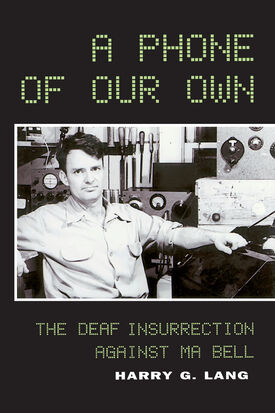
A Phone of Our Own
The Deaf Insurrection Against Ma Bell
Description
In 1964, of the more than 85 million telephones in the United States and Canada, less than one percent were used regularly by deaf people. If they didn’t ask their hearing neighbors for help, they depended upon their hearing children, some as young as three years old, to act as intermediaries for business calls or medical consultations. In that same year, three enterprising deaf men, Robert H. Weitbrecht, James C. Marsters, and Andrew Saks, started the process that led to deaf people around the world having an affordable phone system that they could use.
Weitbrecht, a successful physicist with the Stanford Research Institute, had been experimenting with a teletypewriter (TTY) used with shortwave radios. When Marsters, a prominent deaf orthodontist, met Weitbrecht and saw his TTY, he immediately suggested the possibility of resolving deaf people’s decades-long struggle to have access to telecommunications without relying totally upon hearing people as go-betweens. Andrew Saks brought his business acumen to the group, which soon set to work overcoming the daunting problems they faced.
Harry G. Lang’s A Phone of Our Own: The Deaf Insurrection Against Ma Bell tells how these three men collaborated to solve the technical difficulties of developing a coupling device for TTYs that would translate sounds into discernible letters. More remarkably, and with the help of an expanding corps of Deaf advocates, they successfully assaulted the American Telephone and Telegraph Company (AT&T), which in its efforts to protect its monopoly, smashed old TTYs to keep them from being used for potentially competitive purposes. The Federal Communications Commission (FCC) also resisted efforts to build a telephone system for deaf people that was available, affordable, portable, and fully accessible. Lang recounts in vivid terms how many other Deaf individuals and groups from all walks of life joined Weitbrecht, Marsters, and Saks against these forces. A Phone of Our Own is an entertaining and engrossing story of how they fought and won, and changed the world for the better for deaf people everywhere.
Harry G. Lang is Professor Emeritus at the National Technical Institute for the Deaf at Rochester Institute of Technology.
Reviews
"A Phone of Our Own is much more than another case study of the way mainstream ignorance and profit motives intersected to restrain the production of technological advances of special interest to a minority community (and, in so doing, contributed to that group's marginalization!). For example, Lang chronicles how deaf individuals from across the country, led by Robert Weitbrecht, James Marsters, and Andrew Saks, worked tirelessly from the l960s through the 1980s first to design and then to promote successfully the production and distribution of equipment that has culminated in the current TTY. These unsung deaf adults, Lang further explains, also went on to spur state and federal governments to establish a national telephone relay system that now crisscrosses the nation. Finally, Lang demonstrates how these largely unrecognized efforts have been instrumental in enhancing educational, vocational, and social opportunities for deaf individuals. This untold story of self-activity is a 'missing' chapter in the still unfolding history of the nation's deaf community and, likely, the work's most lasting contribution."
— Disability Studies Quarterly
"A Phone of Our Own is a remarkable and enduring story of innovation and the enduring human spirit."
— Midwest Book Review